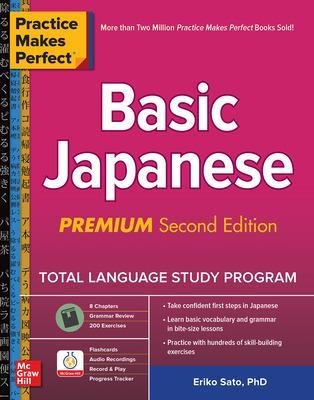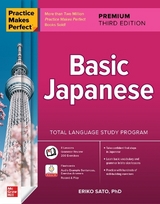
Practice Makes Perfect: Basic Japanese, Premium Second Edition
McGraw-Hill Education (Verlag)
978-1-260-12107-0 (ISBN)
Learning Japanese is easy with this accessible guide. Presented in manageable, bite-sized lessons and engaging exercises, Practice Makes Perfect: Basic Japanese helps you quickly assimilate the basics of the language. Eight chapters are split into bite-sized units, which you can expect to complete in 20 to 30 minutes. The units begin with the basic sounds and writing systems of Japanese, and go on to cover essential grammar and useful vocabulary.
This Premium second edition is supported by more than 60 minutes of audio recordings, streaming via the McGraw-Hill Education Language Lab app. The recordings will help you improve your speaking and listening skills by following the model of native Japanese speakers.
Designed as a study tool for beginning students and as a review for intermediate level learners of Japanese, Practice Makes Perfect: Basic Japanese features:
• An accessible format with simple grammar reviews, clear examples, and engaging exercises• 200 exercises to help you develop your new language skills• Japanese script and corresponding romaji transliteration provided throughout• New: Interactive exercises, available via app and online, that let you assess what you’ve learned• New: More than 60-minutes of streaming audio to guide correct pronunciation and build listening skills
Eriko Sato, PhD, is the executive director of the Japan Center and the founding director of the Pre-College Japanese Language Program at the State University of New York at Stony Brook.
Introduction
1 Let’s say and write Japanese words!
Basic Japanese sounds and kana characters
The first 10 hiragana
The second 10 hiragana
The third 10 hiragana
The last 16 hiragana
Basic vocabulary with simple sounds
Words for body parts
Words for nature
Double consonants, long vowels, and family terms
Small
Adding a vowel
Addressing older family members
Diacritics for voiced and plosive sounds and food terms
Diacritics
Names of Japanese food
Palatalized sounds
Using small
Japanese words you might already know
Reading basic katakana
Special katakana combinations
Country names written in katakana
Writing sentences
Kanji
2 Getting to know someone
Introducing yourself with Hajimemashite
Occupational and respectful titles
Asking Dochira kara desu ka (Where are you from?)
The question word dochira and the particle kara
Personal pronouns anata, watashi, and boku
Names for countries, regions, and cities
Describing the nationality of a person
To say “x is y” with . . . wa . . . desu
To express additional items with . . . mo
Nationality
Languages
Referring to someone with ano
Words for people
Describing the occupation of a person
Creating a modifier using a noun and no
Words for occupation
Words for institutions
Talking about family members
Asking questions
Asking yes/no questions
Answering with “yes” or “no”
Asking “who?”
Greeting and parting
Greeting
Parting
Thanking and apologizing
Saying “thank you”
Apologizing
Referring to things around you
Demonstrative adjectives
Things around you
Demonstrative pronouns kore, sore, and are
Asking “which?” “what?” and “whose?”
The question word dono or dore (which)
The question word nani/nan (what)
The question word dare no (whose)
3 Using numbers
Numbers from 1 to 10
Numbers from 11 to 99
Numbers from 100 to 99,999
Expressing age with the counter sai
Telephone numbers
Telling time
Counters for time: ji and fun
Relative time expressions
Daily time frames
The calendar
Days of the week
Months
Days of the month
Asking “when?”
Question word itsu (when)
Japanese national holidays
Asking “how much?” at a store
Things you might buy at an electronics store
Asking “how much?” with ikura
Shopping by saying . . . o kudasai
Listing nouns with to
Asking “how many?” with counters
Using number phrases in a sentence
Frequently used counters
4 Around town
Basic verb forms and verb classes
Dictionary and masu forms of verbs
Ru and u verbs
Frequently used verbs
Going to the supermarket
Showing the destination with ni or e
The polite non-past negative suffix masen
The negative scope marker wa
Places around town
Stores: . . . ya
Asking “where?” and saying anywhere, somewhere, and nowhere
Asking “where?”
Existential pronouns
Negative pronouns
Habitual actions
Asking about habitual actions with yoku (often)
Frequency adverbs
Making suggestions
. . . masen ka and . . . mashō
Specifying an absolute time with ni
Saying approximately
Expressing the purpose of going with . . . ni iku
Transportation
Specifying the form of transportation with de
Words for transportation
Counters for hours and minutes
Sentence-ending particles ne and yo
5 Talking about activities
Recurring activities
Words for proportional frequency
The direct object marker o
Daily routines
Specifying the location of activities with de
Activities on weekends
The verb to play
Identifying the action performer
Specifying the action performer with the subject marker ga
Specifying the accompanying action performer with to
Talking about the past
. . . mashita and masendeshita
The conjunctions sorekara demo, and desukara
Expressing your plans
. . . tsumori desu
Nai form
Telling what you can do: Potential form
Making requests
Te form
Requesting with . . . te kudasai
Talking about “now” with . . . te iru
Progressive state
Habitual state
Resulting state
Adverbs for intervals
Adverbs for the aspects of an action
6 Talking about people and things and their locations
Existential verbs aru, iru, and irassharu
Pronouns for locations
Animals
Plants
. . . ni (wa) . . . ga arimasu/imasu
. . . wa . . . ni arimasu/imasu
In a house
Rooms and areas in a house
Household items
Things in a bedroom
Expressing where things are
Relative location words
Compass directions
Giving directions
Useful landmarks for giving directions
Actions needed for giving directions
Marking the area covered by movement with o
Marking the direction with ni
The conjunction sōsuruto (then)
The ordinal counter creator . . . me
Expressing human relationships
Expressing events and incidents
Words for scheduled events
Words for accidents, incidents, and disasters
The conjunction sorede (as a result)
7 Describing things
Adjective types
Describing buildings and rooms
Adjectives in the non-past forms
Describing buildings
Describing rooms
Encouraging someone to do something with dōzo
Entering your friend’s house with ojamashimasu
Character of a person
Personality
Question words for state: donna and dō
Adverbs of degree
Appearance of a person
Double subject
Words for describing the appearance of people
Language learning
Expressing degree of difficulty with . . . nikui and . . . yasui
Words for describing courses
The conjunction soreni
Deciding on a travel destination
Sightseeing attractions
Description of places
Seasons and climates
Listing examples with ya
Places you may visit in Japan
Describing a meal at a restaurant
Adjectives in the past tense
Words for ethnic cuisine
Words for tastes
Preferences and skills
Indicating what you like and dislike with ga
Words for preferences
Nominalizing a verb with no
Words for skills
Saying what you want
Expressing desire with hoshii
Expressing desire with . . . tai
Clothing
Words for colors
Words for sizes
Descriptions of clothing
Showing excessiveness with . . . sugiru
Words for clothing and accessories
Verbs for wearing
Trying on clothing:. . . miru
Polite shop language: gozaimasu
Adverbs
Adverbs derived from adjectives
The adverb + suru
Comparisons
Comparing two items to each other
Equivalent-degree comparisons
Superlative comparisons
Words for classes of items
8 Making connections
Stating what you think with omoimasu
The quotation particle to
Plain forms in the non-past tense
Using a relative clause
Using . . . n desu for making connections in conversation
Asking “why?”
Asking for a reason with dōshite
Stating a reason with kara desu
Possible reasons for studying Japanese
Sharing experiences
Expressing experience with koto ga arimasu
Experiences you might have
The counter kai (. . . times)
Forecasting weather
Expressing probability with deshō
Words for weather
Talking about sickness
Talking about a possible case with kamoshiremasen
Symptoms of illness
Diagnosis of illness
Listing and connecting actions and states by using the te form
The clause conjunctions ga and kara
The conjunction ga
The conjunction kara
9 Review exercises
Answer key
McGraw-Hill's Language Lab app:
Flashcards: 40 sets
Audio: Answers to 80 exercises
| Erscheinungsdatum | 08.01.2019 |
|---|---|
| Verlagsort | OH |
| Sprache | englisch |
| Gewicht | 429 g |
| Themenwelt | Schulbuch / Wörterbuch ► Wörterbuch / Fremdsprachen |
| Geisteswissenschaften ► Sprach- / Literaturwissenschaft ► Sprachwissenschaft | |
| ISBN-10 | 1-260-12107-0 / 1260121070 |
| ISBN-13 | 978-1-260-12107-0 / 9781260121070 |
| Zustand | Neuware |
| Informationen gemäß Produktsicherheitsverordnung (GPSR) | |
| Haben Sie eine Frage zum Produkt? |
aus dem Bereich



